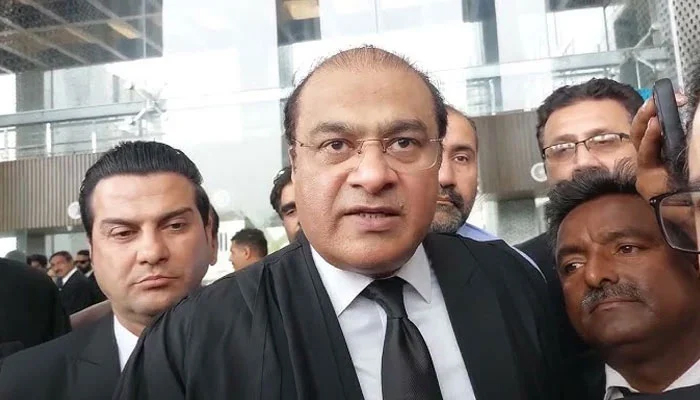Court martial proceedings against former spymaster retired Lt Gen Faiz Hameed have been initiated based on “concrete evidence” following a detailed probe, Inter-Services Public Relations (ISPR) Director General Lt Gen Ahmed Sharif Chaudhry said on Thursday.
Addressing a press conference in Rawalpindi, the military’s spokesperson said the Pakistan Army had no political agenda as it believed in self-accountability.
In a 48-minute media briefing, the DG ISPR spoke about Gen Faiz’s court-martial as an example of the military’s self-accountability, military operations in the wake of the deadly August 26 attacks in Balochistan and Pakistan-Afghanistan ties, among other issues.
Key points:
- Gen Hameed’s court-martial based on “concrete evidence” following detailed probe
- Pakistan Army’s self-accountability system “extremely comprehensive, transparent and time-tested”
- Officers against whom the army takes legal actions are entitled to their rights as per the law
- Deadly Balochistan attacks on Aug 26 carried out “on the directives of internal and external enemies and their enablers”
“Following a detailed inquiry based on concrete evidence, the Pakistan Army announced on August 12, 2024, that the relevant officer (Gen Faiz) had violated sections of the Army Act.”
He added that the army found Gen Hameed, who was arrested last month, to be involved in “several instances of violation of the Army Act”, following which the field general court-martial proceedings against the former spymaster were initiated.
The move, prompted by allegations of misconduct levelled against Hameed by the owner of a private housing society, shattered the long-held perception that spy chiefs were untouchable in the country where generals have long wielded unparalleled influence.
“The Pakistan Army believes in the process of self-accountability, and the process of self-accountability that the army follows is extremely comprehensive, transparent, and time-tested,” DG Chaudhry said.
He detailed that the process worked based on concrete evidence, adding that whenever there was a violation of the established laws and rules within the army, “this robust process of self-accountability speedily comes into effect without any discrimination”.
He said Gen Hameed’s case was referred to the Pakistan Army through the defence ministry in light of a “full belief in the army’s accountability process”, following which the army ordered a “high-level court of inquiry” into the matter.
“There is a clear consensus within the army that it is a national, state-owned institution, which will be prevented from being used for the completion of goals related to specific political agendas”.
He further said: “It is important to know that if any person in the army works for personal interest or forwards a specific political agenda for personal benefit then the army’s process of self-accountability kicks into action.”
While responding to a question later about the case of the former spymaster, the DG ISPR said: “The accusation is there on the retired officer that he crossed legal and constitutional bounds on the instruction of particular political elements for his personal interest.”
Speaking about the legal action taken against officers who violated the laws of the army, he said that all of them were entitled to their rights as per the law, such as appointing a lawyer of their choice and the right to appeal.
“The case against Gen (Retd) Faiz Hameed testifies that the Pakistan Army takes violations carried out for personal and political purposes very seriously and takes immediate action, without discrimination, according to the law.
“We hope that such non-discriminatory self-accountability also persuades other institutions.”
The DG ISPR further said that the armed forces were “well aware of their professional duties” and affirmed that “no compromise of any kind will be done on the national security”.
“A secure Pakistan guarantees a strong Pakistan,” he stated.
Balochistan attacks
Referring to the deadly August 26 terror attacks across Balochistan, the DG ISPR said they were carried out “on the directives of internal and external enemies and their enablers” with the aim to impact Balochistan’s peaceful environment and development by targeting innocent people.
DG Chaudhry recalled that in response, the security forces eliminated 21 terrorists while 14 security personnel were martyred.
“We know that a sense of deprivation and state force is also found among the people of Balochistan, which certain elements exploit on external directives.
“They exploit it so that the ongoing development and public welfare process could be affected through fear and alarm,” he added.
The DG ISPR went on to say that those carrying out the attacks and those ordering them “had no connection with Islam, humanity, Baloch tradition or actions”.
Pak Army, LEAs carry out 130 operations daily
Speaking about the counterterrorism efforts in the country being carried out by the security forces, DG Chaudhry said 32,173 intelligence-based operations were conducted in the first eight months of the year, with 4,021 of them happening in the past month, leading to the neutralisation of 90 khawarij.
He added that the Pakistan Army, police, intelligence, and law enforcement agencies “carry out more than 130 operations daily” to eradicate terrorism.
Stating that 193 brave soldiers embraced martyrdom in the last eight months of 2024, the military’s spokesperson asserted that the entire nation paid tribute to them and their bereaved families.
“The war against Fitna al-Khawarij and terrorism will continue till the eradication of the last khariji and terrorist,” he vowed.
Earlier this month, the government declared the banned Tehreek-i-Taliban Pakistan (TTP) as Fitna al-Khawarij and all other terrorists associated with the group as khariji (outcasts).
The ISPR official then detailed an “important and successful operation” carried out since August 20 in the Tirah valley against the TTP and proscribed organisations Lashkar-i-Islam and Jamaat-ul-Ahrar.
Stating that the operations were based on accurate and solid information, he said 37 terrorists had been killed so far while 14 others were left injured.
“Those sent to hell also included highly wanted khariji leader Abuzar urf Saddam,” DG Chaudhry said, adding that four brave soldiers embraced martyrdom.
“Such IBOs are the evidence of our security forces’ bravery and determination to end the evil of terrorism,” he asserted.
Heightened security concerns
In the latest flare-up of violence, dozens of militants affiliated with the banned Balochistan Liberation Army (BLA) launched numerous attacks across Balochistan last week, killing at least 50, including 14 security men.
A suicide attack also took place in Khyber Pakhtunkhwa’s North Waziristan on August 26, killing four and injuring 15.
Terrorist attacks across the country surged to 59 in August, compared to July’s 38, according to a digital database maintained by the Pak Institute for Peace Studies (PIPS), an Islamabad-based think-tank. The majority of the attacks occurred in KP and Balochistan.
In response to the deadly attacks, the country’s leaders pledged their full support to the Balochistan government in combating terrorism, including financial support worth Rs5 million according to Interior Minister Mohsin Naqvi.
Meanwhile, the military also sped up its counterterrorism operations in KP and Balochistan, which are the most hard-hit by militancy.
Thirty-seven terrorists were killed and 14 others suffered serious injuries in 10 days from August 20 onwards as security forces carried out an extensive operation, ISPR said previously.
In a first Corps Commanders’ Conference held since the Balochistan attacks, the military’s top brass vowed on Tuesday not to let “hard-earned successes” against terrorism go wasted.
It attributed the rise in terrorism to “inimical forces, malicious actors, subversive proxies”, and the “facilitators of external and internal adversaries”.




